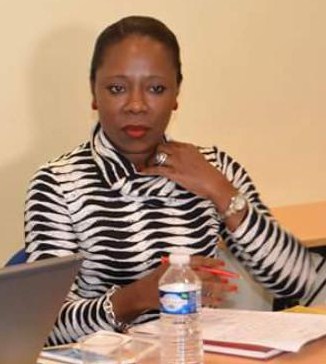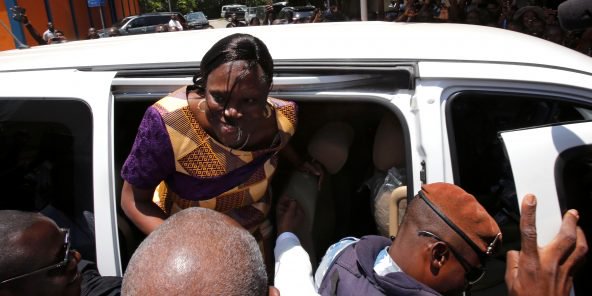Jailed former Cote d’Ivoire’s first lady Simone Gbagbo, others, granted presidential pardon
BY BILL J. FIGHTER
The former first lady of Cote d’Ivoire, Simone Ggbagbo, who was serving a 20-year jail sentence after being convicted in 2015 for her role in the 2010-2011 post-election violence that triggered a civil war killing 3,000 people, was released today, two days after President Alassane Ouattara granted her an amnesty. Eight-hundred people total convicted for the same reason have been granted the presidential pardon, which came on the eve of the 58th anniversary of Cote d’Ivoire’s independence from France.
Early this Wednesday morning, a large crowd of members of the Ivorian Patriotic Front, the political party founded by the former first lady and her husband, Laurent Gbagbo, gathered in front of the courthouse located in Abidjan’s bustling business quarters, Plateau, to witness the release of the former first lady. But they had to hold their breath for several hours before the judiciary proceedings climaxed into the release of the high-profile convict who stepped into freedom for the first time in more than seven years, and was immediately driven to her residence just a few miles away, while the crowds cheered.
Simone Gbagbo was arrested on 11 April 2011 along with her husband, former president Laurent Gbagbo, who stubbornly refused to concede defeat after losing the November 2010 presidential election to the current president, Alassane Ouattara. First placed under house arrest, Simone Gbagbo, 69, was tried and sentenced on 10 March 2015. The former president, who had since been detained at the International Criminal Court (ICC) at The Hague, is being tried for alleged crimes against humanity.
Also: Close-up look at Cote d’Ivoire’s first lady Simone Gbagbo
The convicts granted amnesty include a key Gbagbo ally, former defense minister Lida Kouassi, who was sentenced to 15 years for conspiracy, and the former president’s construction minister, Assoa Adou who only recently, in 2017, was jailed for four years. Of the 800 pardoned by the president, 500 had already been granted provisional freedom. All, according to the presidential ordinance, will have their criminal record cleaned.
The Ivorian civil society welcomes the pardon, hoping it will pave the way for the upcoming local elections and the presidential election in 2020 to be tension-free.
In an interview broadcast by APA news, a spokesperson for the wing of Gbagbo’s fractured party, the Ivorian Patriotic Front, that is loyal to the former president, states the party’s enthusiasm over Simone Gbagbo’s release, but ads more needs to be done for a full-scale reconciliation:
“We have nearly 60 military prisoners who are still in jail, not to mention President Laurent Ggbagbo and minister Charles Ble Goude.”
The spokesperson, who was not identified by name in the recording, but only as “the former leader of the party’s youth chapter,” said “Simone Gbagbo is very popular among the people, the people love her,” and vowed “the party will win the next presidential election.”
For its part, the oldest and largest political party in the country, the late President Felix Houphouet-Boigny’s PDCI-RDA, calls for President Ouattara’s ordinance to be converted into an amnesty law “to make this reconciliation act more inclusive.” The party’s chairman, former president Henri Konan Bedie, stated:
“The PDCI-RDA is steadfast in its belief that only a reconciliation among the daughters and sons of our country constitutes the foundation of social cohesiveness and national unity conducive for a Cote d’Ivoire surely heading in the direction of development and social progress.”

In exclusive remarks to The African magazine, Paris-based Ivorian political analyst Gouza Nahounou welcomes the amnesty as “a powerful act leading to reconciliation,” and salutes “the immense generosity of the head of state, and the high spirit of Cote d’Ivoire’s first lady, Dominique Ouattara.” Calling the release of the 800 convicts “a laudable act,” Nahounou feels, however, that more needs to be done to achieve “a true reconciliation which should involve a number of things: dealing with all the victims and identifying the culprits. If there are no culprits, then setting the cost of pain, the cost of suffering, the cost of the wounds to assure the victims that their pains have been heard.” This analyst feels that the victims in the western region of Cote d’Ivoire, among the We, should receive a special attention, “for this is where the next crisis will originate… We must extinguish the ambers.”
Also: The first lady of Cote d’Ivoire visits the United States
For all its economic accomplishments, the Ouattara regime is blamed both at home and abroad for implementing Victor’s Justice, the notion that only those on the Gbagbo side who have been accused of wrongdoing during the civil war have faced justice, and virtually none on Ouattara’s side.
The amnesty, which Ouattara justifies on the basis of national reconciliation, is a step in the right direction. However, the president’s hint, in a recent interview, that he might run for a third term, against the prescriptions of the new constitution, may be a huge, potentially dangerous step backward.



